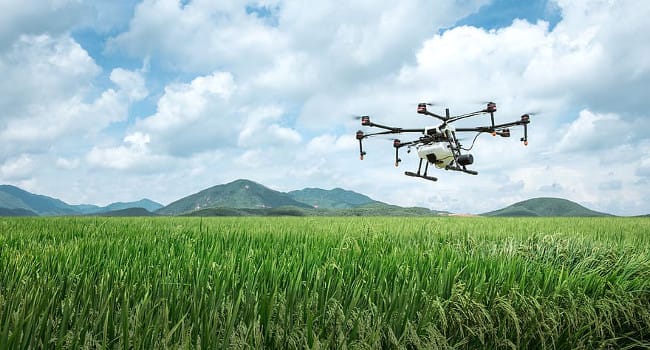Drone Wars on the Pig Farm
Drones have a growing role to play in agriculture, however their security and integrity is essential.

Bio Hazards and subverting supply chains
As the price of drones continue to fall, and the automated software used to control them advances, the applications for the technology will proliferate.
On the one hand they make aeronautics accessible, giving people a chance to use the skies for a range of existing and unanticipated applications. On the other hand they can be used to obfuscate identity and engage in proxy attacks or actions that are difficult to source and identify who is responsible.
For example using drones to depress the price of pork products you want to buy:
Insane story - Chinese pig farmers used jammers to stop drones sent by criminal gangs to infect their pigs with swine fever.
— Ben Westcott (@Ben_Westcott) December 21, 2019
It was discovered when it started to *affect civilian flights' navigation.*https://t.co/mXmSikCpGP
The farm, in northeastern China, was ordered last month to turn in an unauthorised anti-drone device installed to prevent criminal gangs dropping items infected with the disease, according to online news portal Thepaper.cn.
The device came to light after a series of flights to and from Harbin airport complained about losing GPS signals while flying over Zhaozhou county in Heilongjiang in late October. In some cases, the ADS-B tracking technology – which determines an aircraft’s position via satellite navigation – failed.
Chinese state media reported last week that gangs were exploiting the African swine fever crisis by deliberately spreading the disease by using drones to drop infected items on to pig farms. The farmers are then forced to sell meat cheaply to the gangs, who then sell it on as healthy stock, according to China Comment magazine, which is affiliated to state news agency Xinhua.
What’s interesting about this application is that it leverages the psychological effect of drones, both the potential for terror from the skies and the uncertainty of attacks. In this case the primary effect is to pressure the farmer and the price of pork.
The measures taken to prevent the attack also reflect a growing trend. A desire to establish private control over airspace, if not control of the robots who are on your property. This creates an escalating effect, where the drone wars will advance, not because of action between states, but conflict between companies, gangs, and sometimes states.
And it’s not just in China. It’s happening right now in the US:
Unexplained drones are swarming each night over Colorado and Nebraska. Sheriffs are baffled. Residents are unnerved. The feds are investigating. https://t.co/WqCeDfZgJL
— Mitch Smith (@MitchKSmith) January 1, 2020
“It’s creepy,” said Missy Blackman, who saw three drones hovering over her farm outside Palisade, Neb., on a recent evening, including one that lingered right above her house. “I have a lot of questions of why and what are they, and nobody seems to have any answers.”
Since before Christmas, sheriff’s departments in the region have been bombarded with reports of large drones with blinking lights and wingspans of up to 6 feet flying over rural towns and open fields. The drones have unnerved residents, prompted a federal investigation and made international news, even though they may be perfectly legal. And still, they remain unexplained.
“In terms of aircraft flying at night and not being identified, this is a first for me personally,” said Sheriff James Brueggeman of Perkins County, Neb., who has worked in law enforcement for about 28 years and who saw the drones while on patrol Tuesday night.
He said he had heard rumblings about people wanting to shoot down a drone, and had urged residents to report the sightings to law enforcement instead. “I think it’s kind of a joke, but you have to remember the part of the country we live in,” the sheriff said. “People here don’t like their privacy to be invaded.”
While there is an obvious physical element to this, most of it takes place on a wireless or software level. Drone wars are cyber wars as hacking will be the primary means of attack or defence.
Especially if you entertain the notion that hacking is lying to a computer or a computer lying to you (and others).
Drones have a growing role to play in agriculture, however their security and integrity is essential, as often the data or surveillance that a drone engages in will inform what treatments or measures a farmer may take to manage their crops.
Similarly these stories are absurd, but they reflect a growing trend that just as farmers must be wary and defend against predators, perhaps those predators may soon take robot form?!